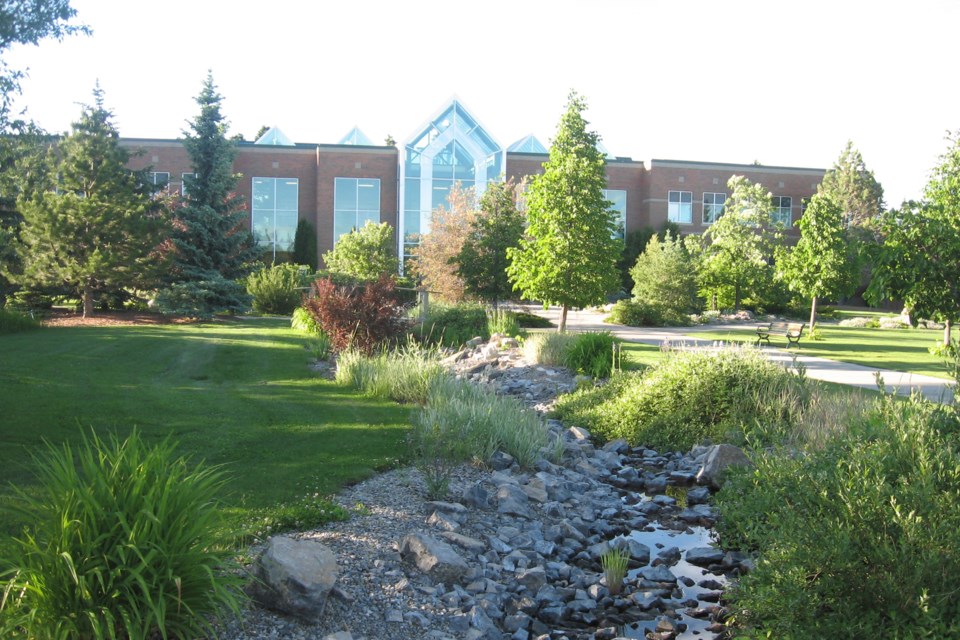MOUNTAIN VIEW COUNTY - County council has come out in support of Olds College and other agricultural post-secondary school attempts to change provincial legislation regarding tiered compensation levels for leadership positions.
At the Feb. 23 council meeting, council approved the submission of an emergent resolution to the Rural Municipalities of Alberta (RMA) spring 2022 session requesting that the Alberta government “eliminate tiering into levels of post-secondaries with the Reform of Agencies, Boards and Commissions Compensation Regulation (RABCCA) regulation or amend it to combine position Level 1 and 2 post-secondary institutions.”
Olds College president Stuart Cullum appeared before Mountain View County council as a delegation on Feb. 23 to outline the issue and answer councillor questions.
In 2021, the government implemented performance-based funding for leadership at post-secondary institutions, which in 2023 will include an administrative expense metric to contain executive and senior leadership compensation.
Under the five-level grid, Olds College is Level 1, the lowest of five levels. As a Level 1 designation, the college would be forced to compensate its leaders, such as deans and vice-presidents, less than what is provided for at higher tiered institutions.
The change may have the consequence of transforming Olds College from being a destination institution into a stepping-stone institution because it would no longer be able to offer compensation to leaders in line with some other post-secondary schools, council heard.
“The creation of tiered compensation levels reduces the ability of colleges and polytechnics to compete and a tiered system creates an explicit hierarchy of post-secondary institutions,” the resolution reads. “It implies that the difference in compensable factors, when comparing senior leadership between post-secondaries, should be far greater than it has historically.”
During his appearance before council, president Cullum said the five-tier system under RABCCA “highly stratifies post-secondaries based on enrolment, based on urban and rural, based on other perceptions of complexity, and that’s where I think we have a significant challenge.
“It does take away the board’s ability to compensate its folks based on the market and it also creates challenges in layers. For rural institutions it is particularly challenging because the rural institutions were put right at the bottom, creating a challenge for rural institutions to compete with their urban counterparts.”
The rural institutions such as Olds College need to continue to be “destination institutions and don’t become stepping-stone institutions, sort of the farm system for the urban institutions,” he said.
Rural post-secondary institutions, including Olds College, are “doing a lot to contribute to the economy of Alberta and the regions we are located in,” he said.
“We are just as valuable as an urban-based institution,” he said. “We need our leaders, our deans and directors and vice-presidents to be paid similar to what they are paying their folks at Bow Valley and Red Deer. We feel that is the appropriate market for our folks. We can attract leadership to Olds College within that context.”
If the RABCCA changes take effect in spring 2023, “we are going to have to take significant salary away from our leaders while the leadership at other institutions in this province aren’t going to have to reduced at all, and I think that is fundamentally wrong. Over time it’s going to become a retention issue and a recruitment issue for our institution.”
If passed by the RMA, the emergent resolution would be used to call for provincial government action.
Coun. Jennifer Lutz called on Olds College to also approach agriculture organizations to support the call for changes to the RABCCA.
Counc. Peggy Johnson said, “I am really concerned about the urban and rural dichotomy that I see in lots of areas, and to me this is just another layer.”
Meanwhile, area municipalities, through the Municipal Area Partnership, have recently approved a letter calling on the provincial government to “consider repealing post-secondary inclusion in RABCCA, or making amendments to RABCCA to ensure Olds College can continue its important role of advancing the agriculture and agri-food industry within our region and throughout the province.”
“We are deeply concerned that the unintended consequence of RABCCA will transform Olds College from being a destination institution that is developing into a world leader in agricultural education, training and applied research into a stepping-stone institution for talent, because it is no longer allowed to compensate its leadership in line with other Alberta post-secondary institutions.”
The RMA represents 69 rural municipalities, including Mountain View and Red Deer counties. It advocates for government action on behalf of its members.



